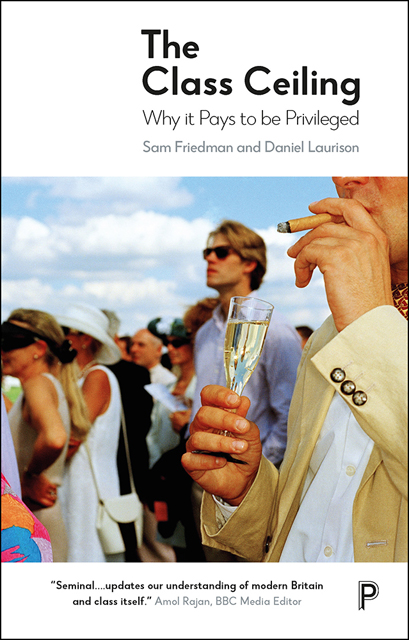Book contents
- Frontmatter
- Dedication
- Miscellaneous Frontmatter
- Contents
- List of figures and tables
- Acknowledgements
- Note on language usage
- Introduction
- one Getting in
- two Getting on
- three Untangling the class pay gap
- four Inside elite firms
- five The Bank of Mum and Dad
- six A helping hand
- seven Fitting in
- eight View from the top
- nine Self-elimination
- ten Class ceilings: A new approach to social mobility
- eleven Conclusion
- Epilogue: 10 ways to break the class ceiling
- Methodological appendix
- Notes
- References
- Index
seven - Fitting in
Published online by Cambridge University Press: 14 April 2023
- Frontmatter
- Dedication
- Miscellaneous Frontmatter
- Contents
- List of figures and tables
- Acknowledgements
- Note on language usage
- Introduction
- one Getting in
- two Getting on
- three Untangling the class pay gap
- four Inside elite firms
- five The Bank of Mum and Dad
- six A helping hand
- seven Fitting in
- eight View from the top
- nine Self-elimination
- ten Class ceilings: A new approach to social mobility
- eleven Conclusion
- Epilogue: 10 ways to break the class ceiling
- Methodological appendix
- Notes
- References
- Index
Summary
“She was just good at selling herself … without … without looking like she was selling, do you know what I mean?” The Future Leaders panel murmur their agreement with Head Judge, Simon. They are discussing the relative merits of two interviewees, Sophie and Martin. Each are vying for a place on television’s most prestigious mid-career scheme, a yearlong programme that takes ‘rising star’ television professionals and provides them with the support, mentoring and network relationships to propel them into senior roles. “Whereas Martin,” Mark continues, “… really impressive, definitely. But it just jarred a little, didn’t it? I’m not sure that works for us …”
On paper, Sophie and Martin have very similar credentials. They have both shone in the early years of their careers. Sophie, white British, privately educated and from an upper-middle-class background, has racked up a series of impressive credits as a documentary producer. Martin, Black British, and from a working-class background, is already a multi-award-winning screenwriter. The panel agree that Sophie and Martin are both comfortably worthy of a place, but there’s only space for one.
We are coming to the end of two intense days observing interviews on the Future Leaders scheme. Hundreds of applicants have been whittled down to 40 or so shortlisted candidates, most of whom have CVs that – while showcasing different specialities and knowledge – are hard to tell apart in terms of experience and achievement. Interviews, then, are key.
After a long discussion Sophie eventually gets the nod over Martin. “All in all, I think she’s a better fit,” Simon says, summarising the panel discussion. Simon doesn’t elaborate on what he means by ‘fit’, but it’s easy to read between the lines. Within seconds of entering Sophie had ingratiated herself, quipping about how the maze-like feel of the building reminded her of a popular ’90s TV game show. Immediately the atmosphere changed. The panel, tense from hours of interview mode, visibly relaxed. The banter continued back and forth, Sophie swapping jokes with the panel about other obscure game shows. Sophie also clearly interviewed well. Her answers to the standardised questions were confident, articulate and knowledgeable. But it is the lasting impact of those first two minutes of interaction that is most striking. Here Sophie’s informal demeanour, her knowing humour, forges an immediate affective energy with the panel, setting the tone for a friendly, sympathetic interview.
Information
- Type
- Chapter
- Information
- The Class CeilingWhy It Pays to Be Privileged, pp. 123 - 144Publisher: Bristol University PressPrint publication year: 2019
